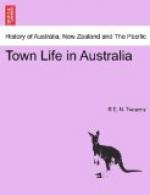Tea may fairly claim to be the national beverage. A large majority of the population drink it with every meal, and you find cases of this even in the metropolitan middle classes. With them, however, it is more usual to drink beer with their mid-day meal, and to have meat-tea in the evening. This practice extends through the upper and middle classes, and into many wealthy houses. Next to tea may be ranked beer, English or colonial, which I have come to think is a necessity to the English-speaking races. But no colonist drinks much at meals. He prefers to quench his thirst at every opportunity that may occur between. In all country towns, if you go to see a man on business, out comes the whisky-bottle. If you meet an old friend, his first greeting is, ‘Come and have a nobbler!’ No bargain can be concluded without it. If it is a warm day, you must have a nobbler to quench your thirst; if it is freezing, to keep the cold out. There is no trade at which more fortunes have been made here than the publican’s. The most exclusive and the most out-at-elbows find a common meeting-place in the public-house; although it is only fair to say that the custom of ‘shouting,’ as it is called, is going—if it has not gone—out of fashion amongst the better classes in the capital cities. Beer, or more frequently spirits, form the favourite ‘nobbler,’ the price of which varies from fourpence to eightpence in Sydney and Adelaide according to the drink. In Melbourne all drinks are sixpence. There is a current story—which I know to be true—of two well-known colonials, who, on landing from the P. and 0. steamer at Southampton, immediately entered the first public-house, and asked for ‘two nobblers of English ale.’ Having drunk the ale, which was highly approved of, one of them put down a shilling, and was walking off, when the barmaid recalled him, and offered eightpence change. ‘By G——!’ was their simultaneous exclamation, ’this is a land to live in, where you can get two nobblers of English ale for fourpence! let us drink our shilling’s-worth.’
Like their American cousins, the Australians are of opinion that there is no liquid worthy to be mentioned by the side of ‘champagne.’ It requires some education to acquire a taste for claret. To the uninitiated sherry and port are chiefly palatable for their spirituousness; but everyone is born with a taste for champagne. It does not follow that everyone knows what constitutes good champagne. No merchant or lawyer, or anyone whose income is over L500 a year, dare give a party without champagne. It is champagne which gives ton. For this purpose it need not be very good.




